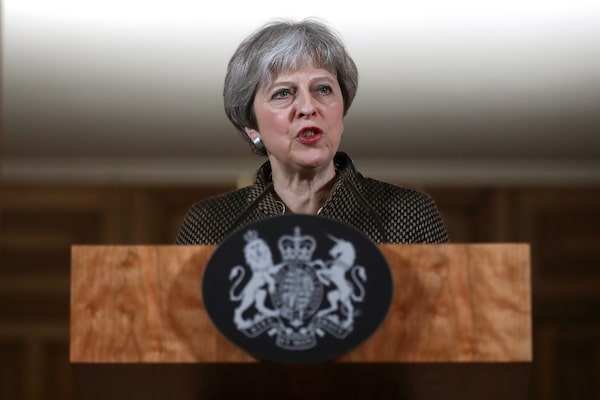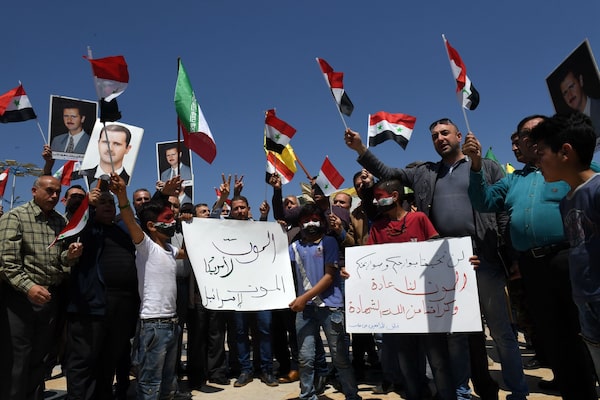Syrian President Bashar al-Assad struck a defiant pose Saturday, as a video posted online showed him strolling into his office on a sunny morning as if the previous night’s U.S.-led strikes against his country were nothing significant.
However, his chief ally, Russian President Vladimir Putin, was far less serene. Mr. Putin slammed the United States and its allies for violating international law, and called for an emergency meeting of the United Nations Security Council, after U.S. and its allies launched an overnight attack designed to punish the Assad regime for its alleged use of chemical weapons.
Russia's President Vladimir Putin (L) meets with Moscow's Mayor Sergei Sobyanin in Moscow, Russia April 14, 2018.MICHAEL KLIMENTYEV/Reuters
In a statement released on Saturday by the Kremlin, Mr. Putin sharply criticized the U.S. for acting before a team from the Organization for the Prohibition of Chemical Weapons -- which arrived in Syria on Friday -- had a chance to investigate the allegations of chemical weapons use. The U.S. and its allies believe Mr. Assad’s forces used chlorine gas, and perhaps nerve agents, in an April 7 attack that drove anti-Assad fighters out of the town of Douma, a key battleground the outskirts of the Syrian capital of Damascus.
“Through its actions, the U.S. makes the already catastrophic humanitarian situation in Syria even worse and brings suffering to civilians,” Mr. Putin said in the statement. “The current escalation around Syria is destructive for the entire system of international relations. History will set things right, and Washington already bears the heavy responsibility for the bloody outrage in Yugoslavia, Iraq and Libya.”
What we know so far about the strikes in Syria
Pentagon says strikes hit Syrian targets as Trump declares ‘Mission Accomplished’
Globe in Beirut: Strikes on Syria threaten a fragile peace in Lebanon
As part of its response, the Russian military said it would consider supplying the Syrian army with its advanced S-300 surface-to-air missile systems. Such a move would make future Western interventions much more difficult, while also threatening Israel’s ability to confront Iran’s growing military presence in Syria.
The U.S.-led attacks, which began shortly before the dawn call to prayer across the Middle East, were limited in scope and lasted only a matter of hours. The Pentagon said that it had struck three sites connected to Syria’s chemical weapons program, one in Damascus, and two near the city of Homs.
The Russian military said there were no reported deaths or injuries in the strikes.
France and the United Kingdom also took part in the assault. In a televised address, U.S. President Donald Trump said the action was necessitated by a “significant escalation in a pattern of chemical weapons use by that very terrible regime.”

British Prime Minister Theresa May attends a press conference at 10 Downing Street on April 14, 2018 in London, England.WPA Pool/Getty Images
Speaking Saturday, British Prime Minister Theresa May said the military action was designed to punish Mr. Assad for his use of chemical weapons, and were not an intervention in Syria’s seven-year-old civil war that has killed more than 500,000 people.
“This is not about intervening in a civil war. It is not about regime change,” she said. “It is about a limited and targeted strike that does not further escalate tensions in the region and that does everything possible to prevent civilian casualties.”
Ms. May did not directly answer questions from reporters about whether the U.K. would again take military action if Mr. Assad were again to use chemical weapons.
French President Emmanuel Macron said his country had joined the attack because “a red line” had been crossed when “dozens of men, women and children were massacred with chemical weapons.”
The Russian military said Syrian air defenses had shot down 71 of the 103 missiles fired by the U.S. and its allies. The claim was impossible to verify.
The video of Mr. Assad walking to work was posted by a Twitter account controlled by the Syrian presidency at precisely 9 a.m. local time, sending a clear message that the regime was continuing business as usual. Crowds of Mr. Assad’s also struck a defiant pose on Saturday, as hundreds rallied in the centre of Damascus, waving the country’s flag and honking car horns.

Syrians wave the national flag and wave portraits of President Bashar al-Assad as they gather in Aleppo's Saadallah al-Jabiri square on April 14, 2018, to condemn the strikes carried out by the United States, Britain and France against the Syrian regime.GEORGE OURFALIAN/Getty Images
Mr. Putin, however, was furious, calling the attack “an act of aggression against a sovereign state” carried out under the pretext of a “staged chemical attack.”
Russia says there is no evidence that chemical weapons were used in Douma, claiming that videos circulating online -- which show dead and dying children with foam around their mouths -- were fabricated by an anti-Assad group.
“Having visited the site of the would-be chemical attack, Russian military experts did not find any traces of chlorine or any other toxic agent. Not a single local resident was able to confirm that a chemical attack had actually taken place,” Mr. Putin said. “In a sign of cynical disdain, a group of Western countries decided to take military action without waiting for the results of the [OPCW] investigation.”
The OPCW announced on Saturday that its fact-finding mission to Douma would continue despite the military action. It’s unclear what evidence will remain by the time the inspectors arrive in the shattered town, which is now under the control of Russian and Syrian forces.
Russia, which has troops, ships and warplanes deployed to Syria in support of Mr. Assad’s regime, had warned it would retaliate if any of its forces were threatened. The threat of a great power confrontation was avoided by the narrow scope of the U.S.-led attack, which avoided striking known Russian military positions.
Speaking before the attack, Imad Salamey, an associate professor of political science and international relations at the Lebanese American University, said the U.S. and its allies would achieve nothing if they simply fired another round of missiles at Syria, as Mr. Trump ordered in 2017, following a previous chemical weapons attack.
“If this will be a move like the other moves -- a hit-and-run kind of move -- it will probably cause more damages than benefits. Assad will continue business as usual. He will continue to attack, and will continue to be backed by Iran and Russia,” Prof. Salamey said.
“The regime will present itself as the underdog who stood up to colonial and imperialist forces and emerged looking victorious.”
 Mark MacKinnon
Mark MacKinnon